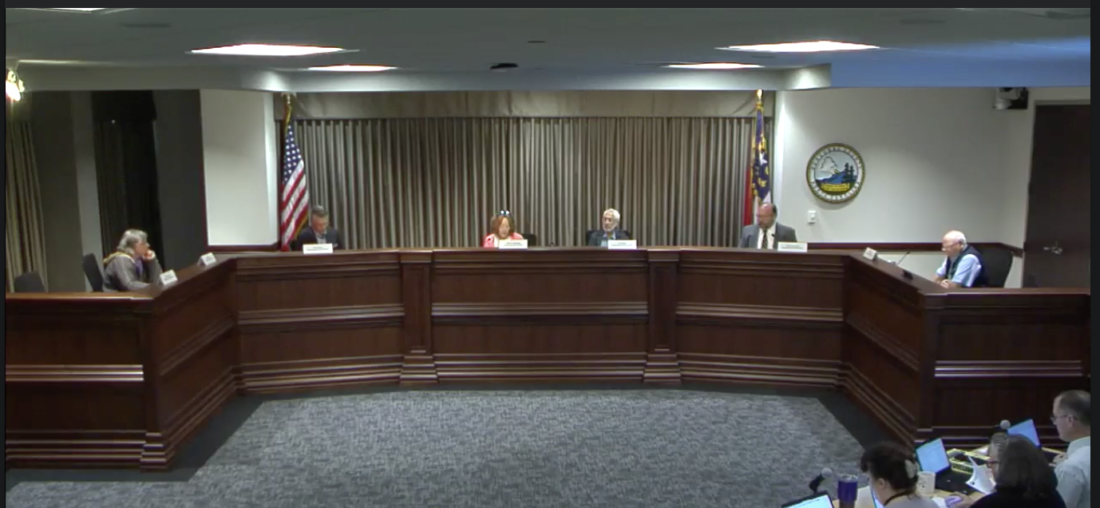After several work sessions and two listening sessions where the public weighed in, the nine-member Buncombe County Planning Board finalized proposed changes to Buncombe County’s short-term rentals ordinance during a work session April 1.
The proposed changes, which would rein in STRs, will be considered at a public hearing Monday, April 22, at A-B Tech’s Ferguson Auditorium starting at 5:30 p.m. Afterward, Planning Board members will vote. If approved, the recommendations would then come before the Buncombe County Board of Commissioners, the governing body that ultimately decides what changes, if any, to make to the county’s law.
The proposed regulations, which were introduced in December as part of the Buncombe 2043 Comprehensive Plan, would ban new whole-house short-term rentals in the unincorporated parts of Buncombe County unless they were located within five commercial zones or in the county’s residential open-use zone. Existing short-term rentals would not be affected by the changes but would require a county permit.
Updates and changes
After receiving feedback from residents, the board updated its recommendations to allow residents who live in open-use districts to operate one or two STRs if the property is at least 2 acres and includes a primary residence. Grouped STRs of three-10 in open-use districts would also be allowed under a special permit.
The board also reversed a previous recommendation that limited the size of STRs to 4,000 square feet after several board members expressed concern that the restriction could shut out families or people who rent STRs for weddings and other events. The new maximum size for STRs is 8,000 square feet. However, the board kept a recommendation that STRs shall not be used for events such as weddings, parties or family reunions with more than 10 visitors in addition to the rental’s occupants without an additional permit.
Board members also settled on grandfathering existing STRs as long as they are used as a rental at least once every year, even if the property changes ownership. Otherwise, the permit lapses. The proposed regulations would require that STR operators or their managers live within 50 miles of the STR and be on call to address complaints from neighbors.
Short-term rentals would be prohibited in all mobile home parks and within attached dwelling units, such as duplexes, townhomes or multifamily units. Travel trailers, recreational vehicles, sheds, vehicles and tents would also be banned from short-term rental use. However, planning staff explained that these structures would be considered when the board discusses homestay rules.
Unanswered questions
Despite progress on the proposed amendments, several board members said there are still many unresolved issues.
Board Chair Nancy Waldrop said that she had several concerns, including the lack of information or direction on homestays, the need to protect quality of life for neighbors and whether the county had the staff to enforce the proposed regulations.
“Perhaps most importantly, we need to know whatever amendments we do recommend can be enforced, whether it be by fines and or denial of permits to STR owners who refuse to comply,” Waldrop said. “We need to know there will be planning staff able to do this. To make amendments that either can’t be enforced or won’t be for whatever the reason is a waste of everyone’s time.”
Other board members expressed concern over the quick pace at which the board is creating regulations and questioned why the controversial issue of STR regulations was the first for the Planning Board to address in its six-module plan for updating the county’s Unified Development Ordinance.
“I do find myself a little sympathetic to people who want to pump the brakes on this a little bit,” said board member Ken Kahn. “I know Brevard is a town with different issues, but it took a couple of years to figure out what they want them to do. And the planning director will remember that I asked, ‘Why are we doing this one first?’ way back then. And I’m still not sure why that is, except I think the commissioners have encouraged us to treat this one first. But that’s still a question in my mind.”




at least a few planning county board members are asking questions about the motives behind the timing and priority of pulling out short term rentals as a singular item in updating the county’s unified development ordinance. it’s the city’s unified development ordinance that hasn’t seen many updates since the mid 1990s that has put a stranglehold on denser development within the city limits. city council talked about it in a retreat almost 10 years ago and didn’t have the leadership to make the call then. think about what a different place our mountain community could be in if they had. until the city ordinances get updated, we’ll see how much difference all these studies and community meetings make.